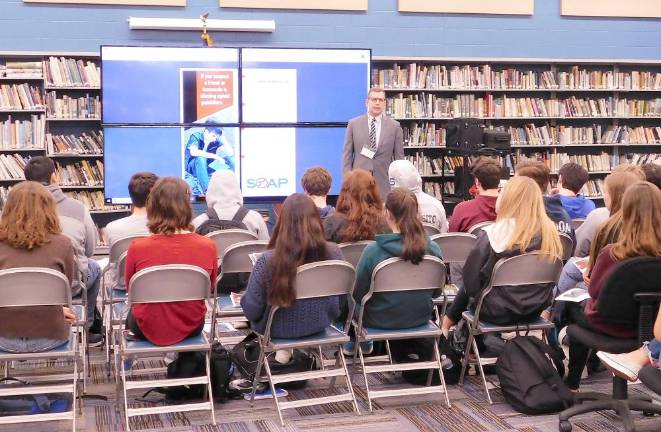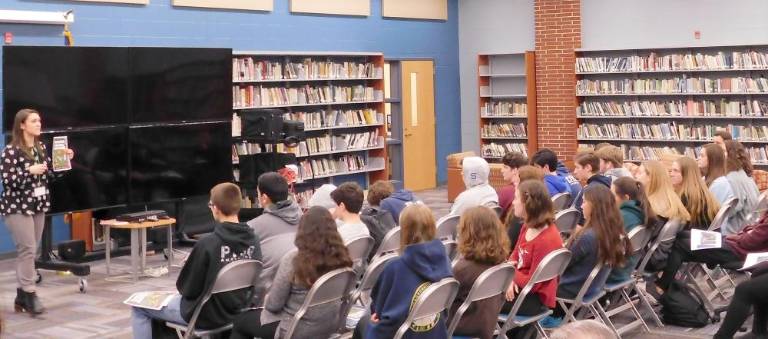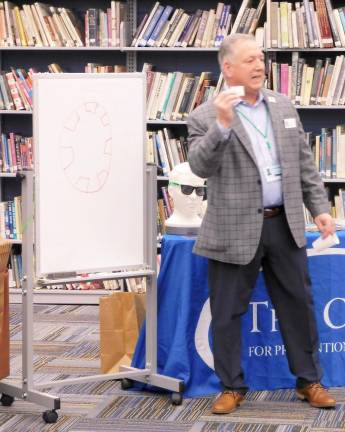'SOAP' teaches student leaders about opioid abuse
Youth. Sussex County Assistant Prosecutor Jerry Neidhardt, Ashley Brown of The Center for Prevention, and Bill Ashnault of the Garden State Pharmacy Owners Association spoke about opioid abuse during a SOAP (Stop Opioid Abuse Program) at Sparta High School on Wednesday.



By Mandy CoristonBy Mandy Coriston
A unique partnership between the Garden State Pharmacy Owners and the NJ State Interscholastic Athletic Association (NJSIAA), along with state agencies and non-profits like Partnership for a Drugfree NJ and locally, The Center for Prevention, led to the development of a presentation designed to teach high school athletes, club leaders, and student government members about the dangers of opioid abuse and ways they can be proactive against addiction amongst their peers. The SOAP (Stop Opioid Abuse Program) presentation was delivered to 28 student leaders at the Sparta High School on Wednesday, Mar 4, and featured speakers from The Center for Prevention, the Garden State Pharmacy Owners, and the Sussex County Prosecutor’s Office, and packed a lot of informational punch into a 40-minute session in the media center.
Jerry Neidhardt, an assistant county prosecutor who works closely with the drug task force, spoke briefly about the real-life implications of opioid usage, putting a human spin on the legalities of drug use. Neidhardt said much of the crime seen in the county is secondary to substance dependency, including the majority of thefts and burglaries, as people struggling with addiction turn to illegal means to find the money for drugs.
“The legal system is expensive, but the real cost can be life or death,” Neidhardt said, recounting anecdotal evidence where young lives were lost to opioid usage locally.
“When we deal with cases like friends accidentally killing friends,” he said. “We are looking at a loss of life that is unnecessary.”
Statistics from the Prosecutor’s Office show that deaths from overdose in on the rise in Sussex County, from seven fatalities in 2007 up to 40 lethal overdoses last year, and 11 already reported in Jan 2020.
“When you get involved with drugs, you are playing Russian Roulette with your lives,” Neidhardt said. “And it’s a lot easier to just not start than it is to stop. If you are in a situation where you need immediate help, call 911. The police won’t be there to charge you; they are there to help the person overdosing.”
Bill Ashnault, representing the Garden State Pharmacy Owners, spoke to the assembled students about the chemistry of opioids and the rapid effect they can have on the brain. Explaining that synthetic fentanyl that is now found in most street drugs, Ashnault used a sugar packet as an analogy of the small quantity of fentanyl that would be needed to trigger multiple overdoses and/or fatalities.
“Drug dealers aren’t your friends,” he said. “And there’s no quality control on illicit drugs. Fentanyl is 10,000 times more potent than morphine, and it’s found in almost all cocaine and heroin out there today.”
Ashnault also talked about the brain’s receptors, calling them ‘parking spots’ for substance dependency.
“When you ‘park’ a drug there- and it only takes once or twice- you create a chemical reaction that your brain begins to expect,” he said. “And then, there may be no way out.”
Both Neidhardt and Ashnault emphasized that substance abuse doesn’t always have to be opioid-based, and encouraged the teens to mind their own and their friends’ use and potential misuse of drugs ranging from painkillers, alcohol, and marijuana to prescriptions used for treating anxiety and ADHD.
Ashley Brown from The Center for Prevention shared a video from State Attorney General Gurbir Grewal, featuring professional athletes offering their stance on sports injuries and healing, and testimonials from former student-athletes who fell into substance abuse after being sidelined by pain. The video will soon become mandatory viewing for school sports participants statewide, joining the informational literature which student-athletes are currently required to read and sign. Brown also brought posters for the attendees to bring back to their respective clubs and teams and to hang up around the school.
“When we create our programs, we think about who our key partners are around the county," Brown said. "If we want to protect our youth, YOU are key partners in helping your peers. We want to give you the tools and the talking points and empower you to be able to talk about and prevent the use of opioids.”
Sparta High School Athletic Director Steve Stoner arranged for the SOAP presentation after being contacted by The Center for Prevention, and he invited the students who attended.
“Unfortunately, this is something our kids have to deal with,” Stoner said. “But the kids who came today are our leaders in sports, marching band, student government...they will spread the word, and their peers will listen.”
Kurt Praschak of the Success Communications Group handles public relations for both the Garden State Pharmacy Owners and the NJSIAA and helped get the two groups connected.
“Numbers point to student-athletes having a higher rate of substance abuse issues, due to medication often prescribed after an injury and the recovery process,” Praschak said. “By bringing the pharmacy owners and the athletic association together, this program came to be.”
Anyone wishing to bring the SOAP presentation to their school or community group can contact Praschak for more information or to make arrangements. He can be reached by email at kpraschak@successcomgroup.com.